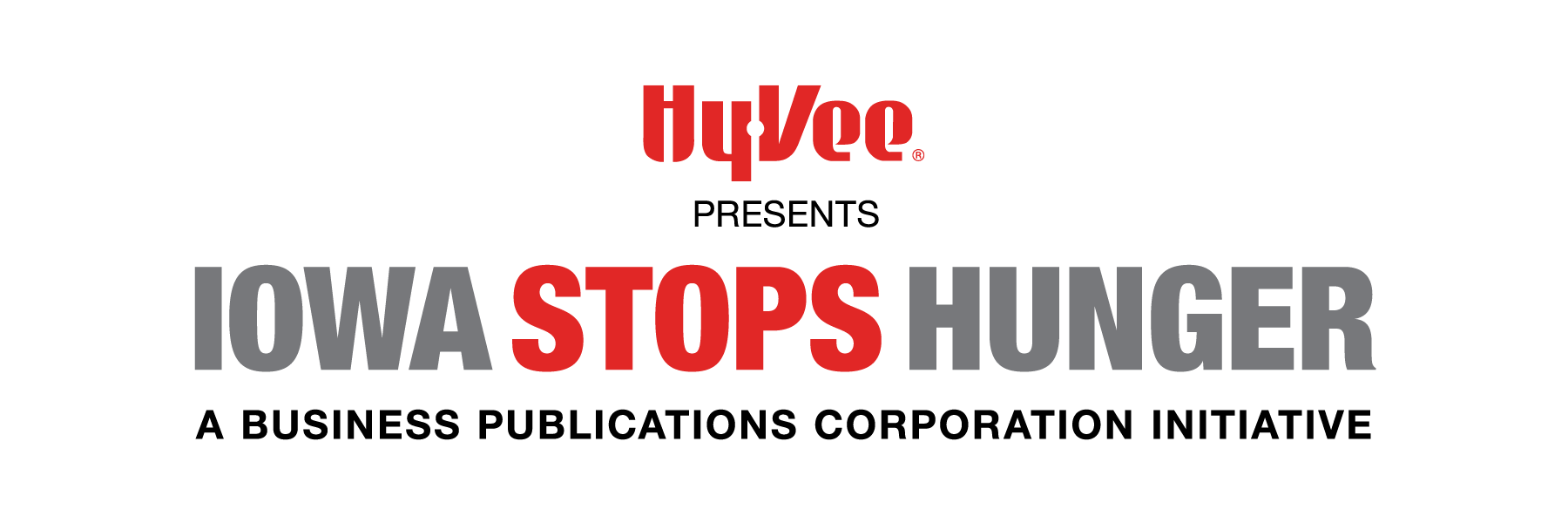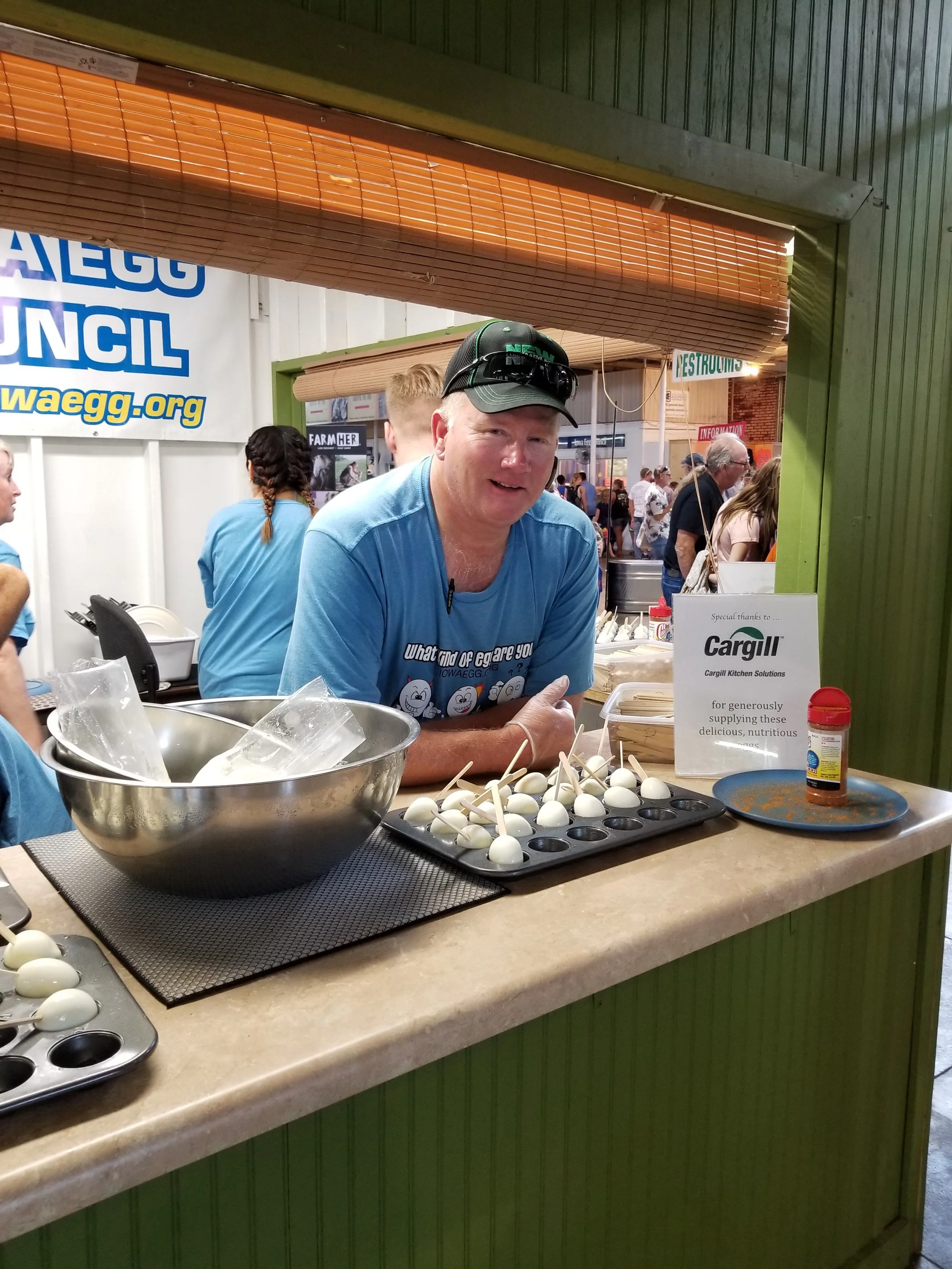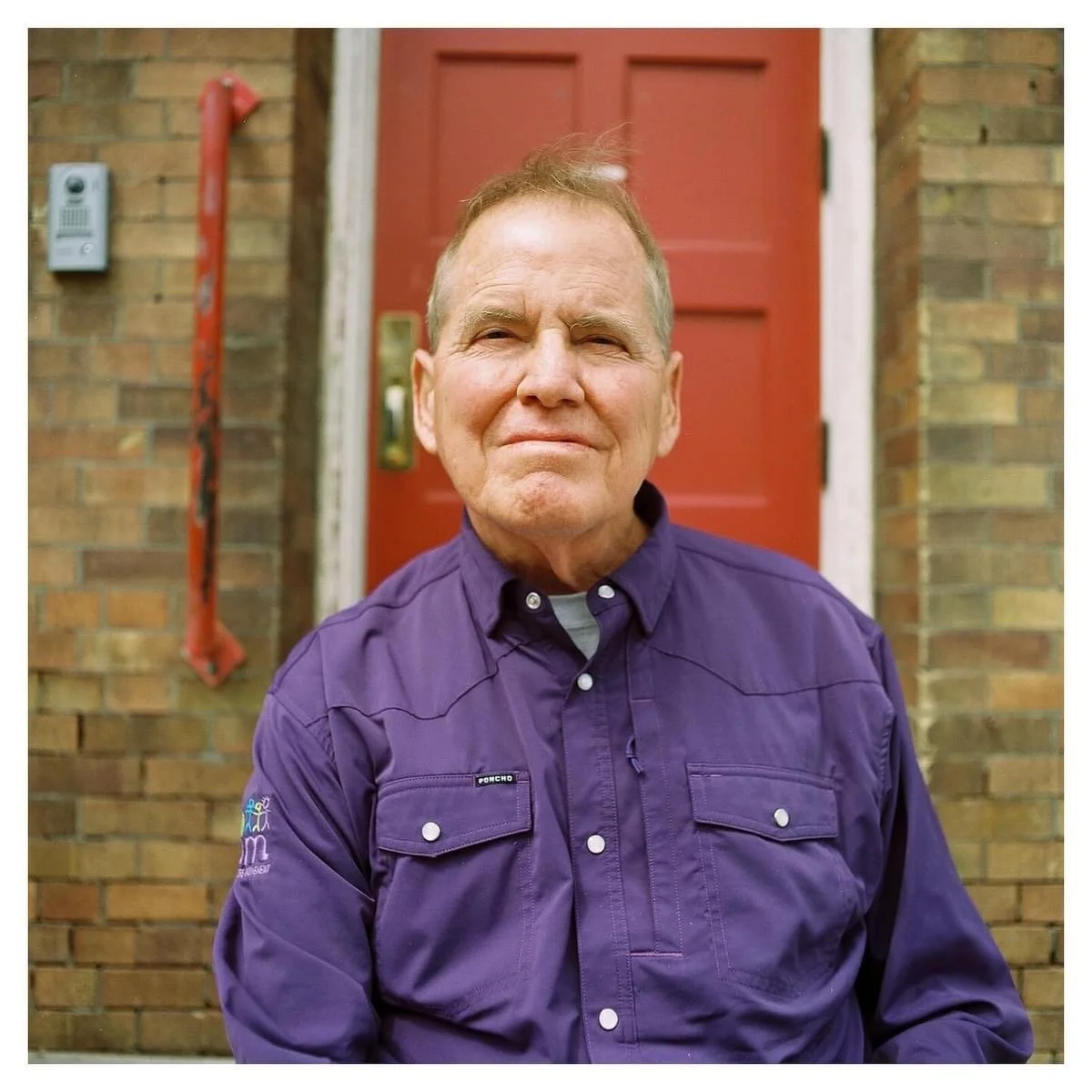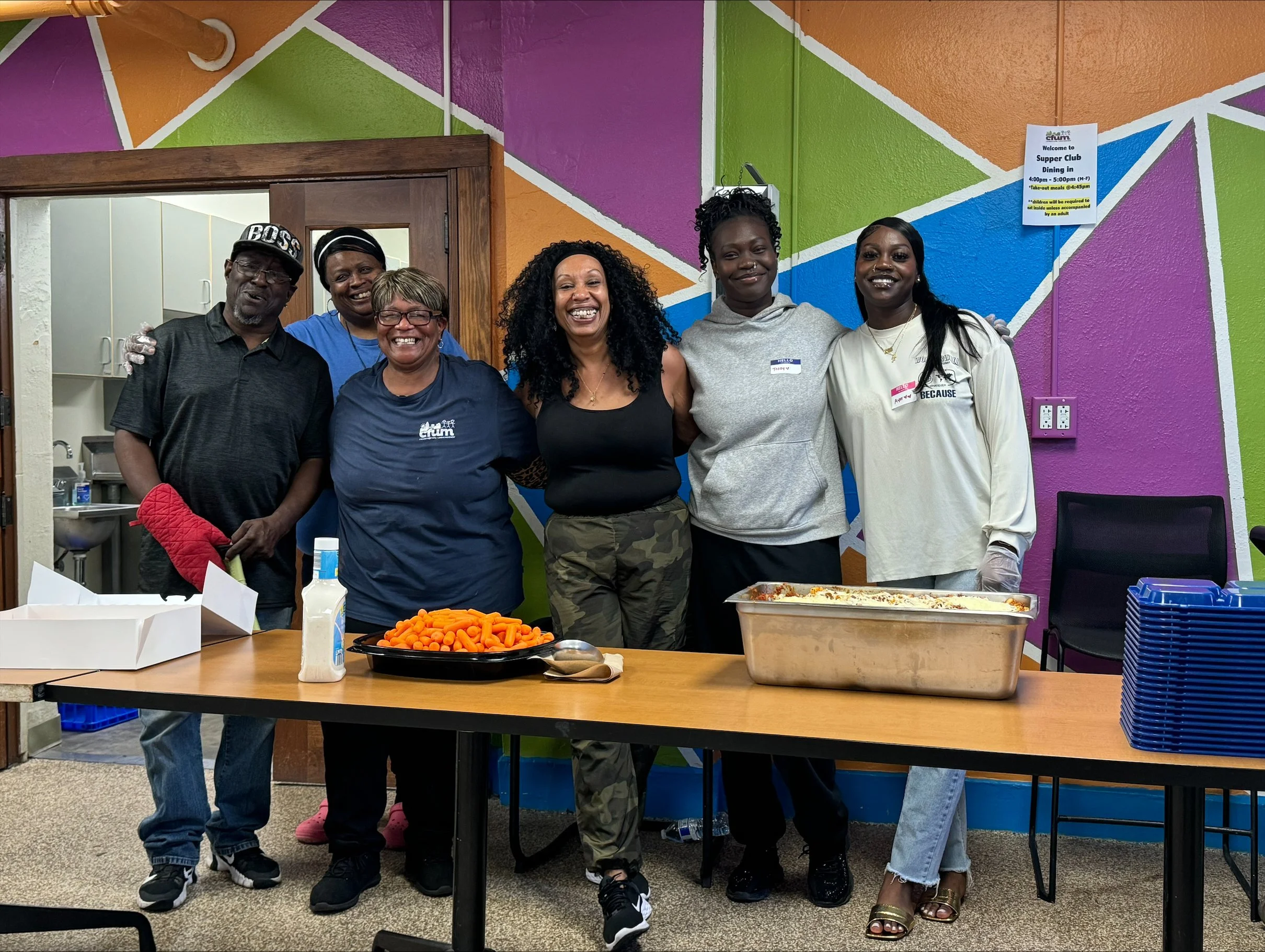Meet four Iowans who are leading the charge to alleviate hunger
by Jody gifford
Kevin Stiles
Executive director (retired), Iowa Egg Council and North Central Poultry Association
The Work
When you think of the staples one could receive from the Food Bank of Iowa, eggs might not be the first thing that comes to mind. But Kevin Stiles, who recently retired as executive director of the Iowa Egg Council and the North Central Poultry Association, is helping to get them on shelves across Iowa.
In 2018, Stiles spearheaded an effort to get egg farmers and producers to commit to providing the Food Bank of Iowa with enough eggs each month to help feed hungry families. Affectionately called “Cracking Hunger,” their combined efforts deliver more than 36,000 dozen eggs — or 432,000 individual eggs — every month to alleviate hunger in Iowa.
“If you’re in agriculture, it’s a natural tendency for you to feel like you have a real role in feeding the world,” Stiles said. “For our egg farmers, you know, they take that role very seriously, and it’s important to recognize that they have donated to Iowa food banks for years.”
The Back Story
“We consistently hear from our food bank partners that eggs or other meats and protein forms are among the most in-demand items and the hardest to obtain,” Stiles said. “We certainly feel an obligation — our farmers feel an obligation — to continue to do what we can to provide eggs.”
Stiles said the collective effort to stock Iowa’s food banks started years ago and ramped up in 2018. They helped farmers build relationships with food banks and coordinated efforts to provide eggs more consistently throughout the year, not just during the holidays and National Egg Month in May.
Not long after that kickoff, Stiles said the campaign reached a fever pitch. Even during the COVID pandemic, egg farmers stepped up and continued to deliver eggs to those in need. Nothing, not even avian influenza and other challenges, held them back from making good on
their goals.
“I’m really pleased to say that our egg farmers have continued to step up and do the job of providing eggs and nutritious protein to families across the state of Iowa,” he added.
The Key to Success
While Stiles doesn’t farm himself and he’s retiring in September, he said playing a role in the outreach to Iowa’s food banks has been a good opportunity to “do the right thing,” to help provide more wholesome food choices for people in need.
“Egg farmers across the country have been doing this for years and years, so it’s not something new,” he said. “But hopefully it’s something that can provide eggs on a more consistent basis throughout the year.”
Volunteer Tom Olson serves eggs at the Iowa State Fair. Photo courtesy of Iowa Egg Council.
Anna Mullen
Senior manager of digital marketing, FoodCorps
The Work
Anna Mullen has long understood the impact of food insecurity on vulnerable communities, which has motivated her efforts to raise awareness and advocate for change. She has supported Heifer International with her congregation at Grace United Methodist Church in Des Moines, initiated a food-salvaging program with the Catholic Social Workers House in Kansas City, interned with the World Food Prize and taught others how to garden and harvest their own food. She’s made the fight against food scarcity one of her life’s missions.
Today, she serves as the senior manager of digital marketing at FoodCorps, a nonprofit organization that partners with schools and communities to “nourish kids’ health, education and sense of belonging” by providing meals, food education and experiences that contribute to their overall health and well-being. Mullen is also a master gardener and certified yoga instructor.
The Back Story
“I was lucky to grow up in a family that really valued eating together,” Mullen said. “Having dinner together and sharing food together was very important. It taught me the importance of connection to your people and your community.”
While Mullen credits her family’s influence, it was college where she developed an interest in food justice and local food movements. She lived for a while on an education farm in Massachusetts, where school and church groups came to learn about local food systems and sustainability, which furthered her passion for agriculture.
“Food is a human right, and there’s enough food in the world that there’s no excuse for people to be hungry,” Mullen said. “We all need food to nourish and thrive, but food is essential to helping kids not only focus in school but to feel good and be supported. It helps them grow into young adults who have their passions and excitement and ways that they want to contribute and be part of their community and their world.”
The Key to Success
Before coming to FoodCorps, Mullen worked at the National Farm to School Network, a nonprofit that connects schools and early education sites with fresh, farm-grown food.
During the pandemic, Mullen noticed that schools become a central hub for feeding people during a time of crisis. She saw firsthand how schools use their big kitchens to cook and serve hot meals and distribute boxes of food to folks who didn’t have easy access elsewhere.
“I thought it was a really beautiful example of community resources going to address food insecurity,” she said. “It painted a picture of the possibility of how communities can continue to use our current networks and infrastructure to address food insecurity. We proved to ourselves we actually can do it.”
Andy Bales
Executive director, Children and Family Urban Movement
The Work
Every morning before school starts, kids line up at Moulton Elementary School eager to eat a hot breakfast before their day begins. The Breakfast Club is a year-round program with a two-part goal: to serve children a nutritious meal to start the day and to provide early-morning child care for working families whose day begins before the sun comes up. Last year, the club served 5,893 meals to kids in the district.
The Breakfast Club is operated by the Children and Family Urban Movement (CFUM), whose mission is “to create a community that supports the potential of children, youth and families through educational success, healthy living and community engagement.”
As its executive director, Andy Bales raises money, recruits volunteers and works to alleviate hunger in one of the most economically challenged neighborhoods in Des Moines. He calls it a labor of love.
“I can’t bear to see a child go hungry,” Bales said. “We’re across the street from Moulton Elementary, where I think probably 88% to 90% of the kids experience food insecurity. I’m just working hard to make sure kids have enough to eat.”
The Back Story
The Des Moines chapter of the Black Panther Party established the Breakfast Club in 1968 as part of a free breakfast program that reportedly fed more than 100 children daily. Today, it’s supported not only by CFUM but also by local retailers like Hy-Vee and Capital City Fruit, private donors and nonprofit food banks. On any given morning, kids enjoy wholesome, nutritious meals that consist of eggs, pancakes and all the fixings before heading off to school.
Bales is no stranger to food insecurity. For years, he worked as the president and CEO of the Union Rescue Mission in Los Angeles’ Central City East neighborhood, better known as Skid Row. He said he’s helped feed millions of people over the years.
But what’s taught him the greatest lesson is not the work, but a personal illness that showed him firsthand what it means to be hungry. “I’ve developed a shortage of enzymes in my pancreas, which doesn’t absorb nutrients,” he said. “So I have been diagnosed with something that causes me to be malnourished and hungry all the time. There’s only a limited number of foods I can eat.”
Volunteers with Children and Family Urban Movement cook and serve meals to families in need as part of the Breakfast and Supper Clubs. Photo courtesy of CFUM
The Key to Success
While it takes many hands to make the Breakfast Club a reality, Bales said he’s confident that there are resources to do more for children and families in Central Iowa.
“Because of the generosity of so many donors, we can address hunger in Des Moines,” he said. “Now I know that if we really had the will, we could do so much more. I think there are 100,000 food-insecure kids in Iowa, and if we organized in a collaborative way, we could address food insecurity statewide.”
In addition to the Breakfast Club, CFUM’s Supper Club serves dinner to anyone in the neighborhood who needs a meal. In 2023, the Supper Club served approximately 125 meals per week, which adds up to more than 30,000 meals a year.
“People who have plenty to eat and are doing well … if they would just take the time to buy a few extra groceries, not for themselves, but for others, we would see a movement where people won’t go to bed at night hungry,” Bales said.
Currently, only Moulton Elementary School offers the Breakfast and Supper clubs, but Bales said his team hopes to add another location this fall. As he put it, “We’re willing to go anywhere where we can meet the needs of kids who are hungry.
Bambi Press
Healthy aging director, Iowa Department of Health and Human Services’ Division of Aging and Disability Services, and the Nutrition and Aging Resource Center
The Work
In her role as a health aging director with both the Iowa Department of Health and Human Services and the Nutrition and Aging Resource Center, Bambi Press works with older Iowans to get them the nutritional services they need to be healthy and thrive in their later years.
One of the initiatives she champions is the Iowa Cafe, a partnership between more than 40 local agencies on aging and licensed food establishments, including restaurants, food trucks, cafes, grocery retailers and convenience stores. Participants receive a credit- or key-style card to get nutritious meals at these locations, where they also have a chance to socialize.
“These restaurant partnerships really meet people where they are,” Press said. “Aging doesn’t look like it used to. A lot of people are working longer, they’re serving as caregivers, they have more demands on their time. So that traditional model of a person who is retired, who is going to a faith center for a meal at 11:15 on a Tuesday morning, maybe doesn’t work for them. So this is a great way to reach people who need a little more choice and flexibility to access those services.”
The Back Story
Press said her first exposure to the challenges older Iowans face came when she volunteered at a senior center in West Des Moines. “I started out volunteering, teaching nutrition and physical activity classes with older adults,” she said. “I made a lot of great friends in that center, and one thing sort of led to another. There was a need for someone to get involved with the Meals on Wheels program, and it just made sense. They found me.”
Her work with the Iowa Cafe is an extension of her interest in supporting Iowa’s aging population. Armed with her experience and motivation to make a difference, she is committed to understanding and dismantling the barriers older Iowans face.
Her team works with six area agencies to help them deliver meals to individual homes and group sites across the state. “Those programs saw about a 60% decline between about 2010 and 2019,” she said. “We started looking at what the barriers were and why people weren’t taking advantage of these services, even at a time when we know food insecurity and, more specifically, nutrition insecurity continues to be a problem for older Iowans.”
The Key to Success
Press said she is committed to supporting the Iowa Cafe as it expands to serve other areas in Iowa. She encourages people to reach out and learn more, especially about the Older Americans Act and the array of benefits it offers. Congress enacted it in 1965 and reauthorized it in 2020.
“If you want to get involved, if you’re able to volunteer, if you’re able to support your local program, they could really use your support,” she said. “We’d love to get more people connected.”







